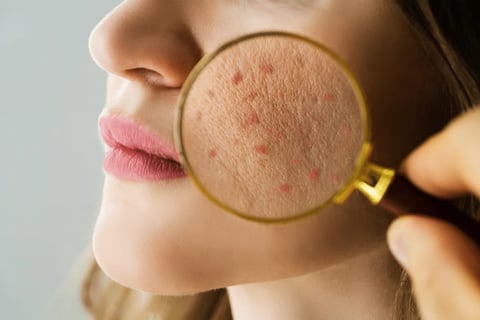Azelaic Acid Vs. Vitamin C - Which Is Right For Your Skin
When it comes to skincare for anti-acne and skin whitening, two powerful ingredients often come up in discussions: azelaic acid and vitamin C. Each has its unique benefits and can address specific skin concerns. This article will help you understand which one might be right for your skin type and issues.
What is Azelaic Acid
Azelaic acid is a natural organic acid found in plants such as cereals, wheat, rye and barley. In addition, Malassezia on the skin surface can also synthesize and secrete azelaic acid. The molecular structure of azelaic acid makes it a dicarboxylic acid, so it belongs to neither the alpha-hydroxy acid (AHA) or beta-hydroxy acid (BHA) family. Azelaic acid has antibacterial, anti-inflammatory, anti-keratinization of hair follicles, inhibits oil secretion, and has freckle-lightening effects.
What Does Azelaic Acid Do For Your Skin
Antibacterial and anti-inflammatory
Azelaic acid is a clinically classified antibacterial drug, mainly used to treat skin diseases such as acne and folliculitis.
Anti-pigmentation
Azelaic acid can play an antioxidant role, inhibit the production of melanin, it can effectively reduce facial pigmentation, and improve symptoms such as dull skin.

Acne Treatment and reduce acne marks
Azelaic acid can also reduce acne marks to a certain extent, and can promote blood circulation in the local skin, thereby reducing acne marks.
cne, commonly known as "pimples", is a chronic inflammatory disease involving the hair follicles and sebaceous glands. The "Guidelines for the Treatment of Acne in China (2019 Revised Edition)" recommends that azelaic acid has the effects of inhibiting Propionibacterium acnes, anti-inflammatory or mild exfoliation, and is a second-line topical medication for mild to moderate acne. In addition, it can also effectively lighten brown or brown acne marks, so it is suitable for patients with both acne and acne marks, or for patients with uneven skin tone, dark skin tone and acne.
Treatment of rosacea
Rose acne, also known as "rosacea", is mainly manifested by paroxysmal facial flushing, persistent erythema or papules, pustules, capillary dilation, etc. The "Chinese Guidelines for the Diagnosis and Treatment of Rosacea" recommends azelaic acid for improving the papules and pustules of rosacea, with a common concentration of 10%, 15% or 20% in creams or gels.
Treatment of melasma
Melasma, also known as "butterfly spots", may be caused by increased melanin synthesis, vascular hyperplasia in the lesions, inflammatory reactions, and microecological imbalance. The "Chinese Expert Consensus on the Diagnosis and Treatment of Melasma (2021 Edition)" recommends the topical use of 15%-20% azelaic acid cream for the treatment of melasma, with a course of about 6 months, mainly for simple pigmented melasma.
Exfoliation
Azelaic acid promotes gentle exfoliation, which can help in unclogging pores and improving skin texture.
Treatment of other skin diseases
Excessive pigmentation can occur in a variety of other skin diseases, such as malignant melanoma, post-inflammatory hyperpigmentation, actinic keratosis, burns and other physical trauma. Topical application of azelaic acid has been reported to produce satisfactory clinical results in the treatment of hyperpigmentation.
Is Azelaic Acid Safe
Azelaic acid is one of the few key topical medications for patients with acne and rosacea during special periods. Azelaic acid is a natural carboxylic acid with few side effects, non-toxic, non-teratogenic, and non-mutagenic properties. It can be used to treat acne and rosacea.
Currently, retinoic acid, salicylic acid, and isotretinoin, which are commonly used to treat acne and rosacea, may affect fetal development and they are contraindicated for use by women.
Azelaic Acid Precautions
Be careful not to allow the drug to come into contact with the eyes, mouth or other mucous membranes;
When used with other drugs, it is recommended to wait at least 30 minutes before use;
During use, pay attention to skin moisturizing and strict sun protection.
What is Vitamin C
Vitamin C is referred to as ascorbic acid, but it’s not necessarily considered an exfoliating acid in the same way that azelaic acid, BHAs, and AHAs are. Rather, Vitamin C is a potent antioxidant that naturally fulfills a variety of purposes in the body.

Vitamin C Beneftis for Skin
- Improve skin elasticity: Vitamin C can promote collagen formation. As collagen increases, skin elasticity will also increase. Therefore, vitamin C can usually improve skin elasticity.
- Promote skin cell repair and regeneration: In the process of skin cell metabolism, vitamin C plays a relatively important role and can promote skin cell repair and regeneration.
- Antioxidant: Vitamin C is an antioxidant that can help the skin resist free radicals and various harmful substances, reduce the damage of oxidation to the skin, and effectively delay skin aging.
- Improve skin immunity: Reasonable supplementation of vitamin C can usually improve the skin's immunity to a certain extent and help the skin resist bacteria, viruses and other pathogens.
- Improve urticaria: Vitamin C has a certain improvement effect on urticaria, mainly because vitamin C can act on blood vessels, thereby alleviating the symptoms of urticaria.
Azelaic Acid Vs. Vitamin C: Which One Should You Choose
For Acne-Prone Skin
If you have acne-prone skin, azelaic acid might be the better choice due to its antibacterial and anti-inflammatory properties. It helps in reducing acne and preventing future breakouts without causing irritation.
For Hyperpigmentation
Both azelaic acid and vitamin C are excellent for treating hyperpigmentation. However, azelaic acid might have a slight edge as it directly inhibits melanin production. Vitamin C, on the other hand, helps in fading existing dark spots and brightening the overall skin tone.
For Anti-Aging
Vitamin C is highly effective for anti-aging due to its role in collagen production and antioxidant protection. It helps in reducing fine lines, wrinkles, and other signs of aging.
For Sensitive Skin
Azelaic acid is generally well-tolerated by sensitive skin types due to its anti-inflammatory properties. Vitamin C can sometimes cause irritation, especially in higher concentrations, so those with sensitive skin might want to start with a lower concentration or choose a derivative like sodium ascorbyl phosphate.
Conclusion
How to choose azelaic acid and vitamin C in your skincare, depends largely on your specific skin concerns and type. For acne and sensitive skin, azelaic acid is a powerful yet gentle option. For anti-aging and skin brightening, vitamin C is unmatched. XI AN CHEN LANG BIO TECH CO., LTD supply high quality and azelaic acid powder and other skincare cosmetics ingredients powder with best quality and price. Please send inuqiry to Email: [email protected]
